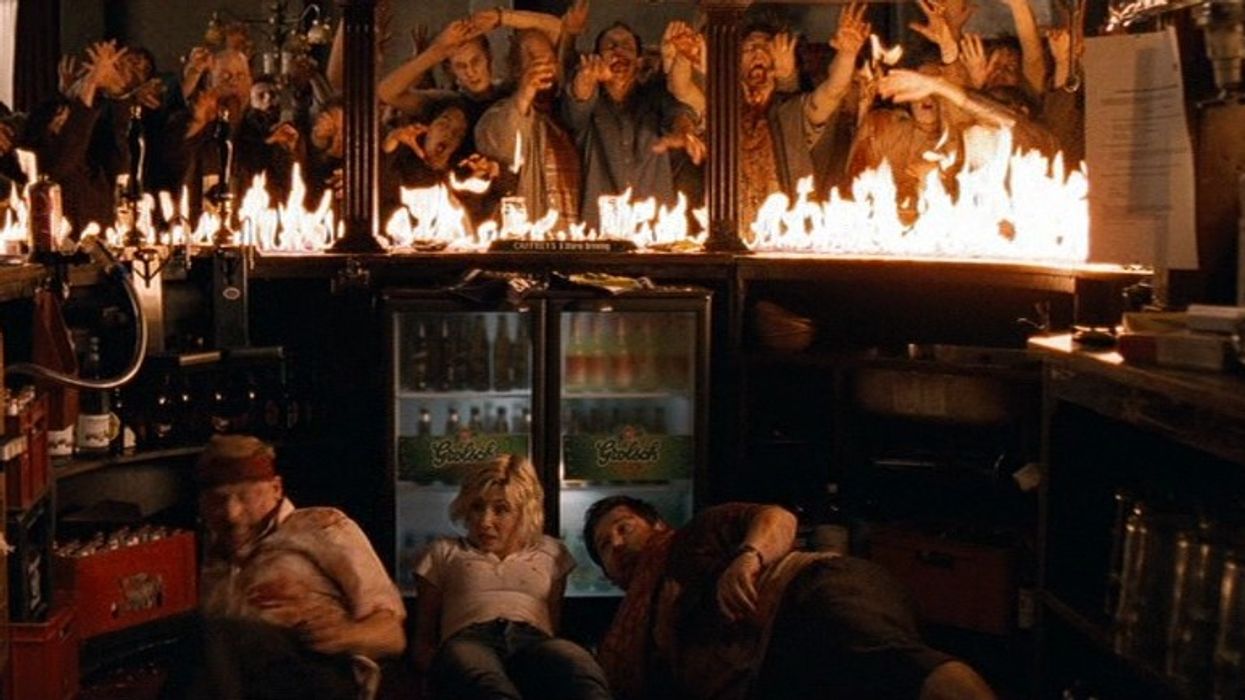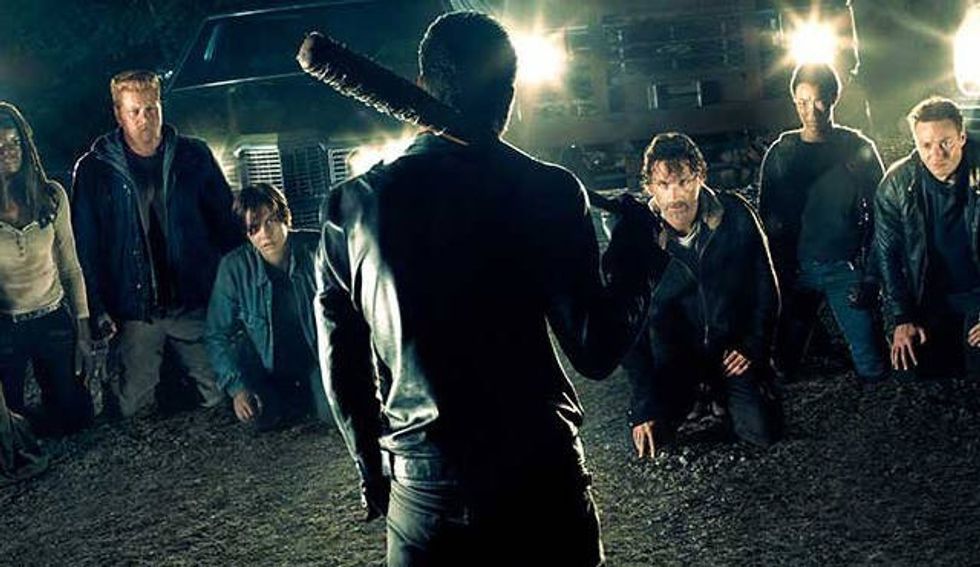Why Do We Keep Bringing Zombies Back from the Dead?
Zombies are one of the coolest creatures out there, but how do you make them meaningful monsters?

The zombie genre is an oversaturated one that often uses zombies as a mindless writing element to threaten the characters of a story. While it is fun to watch, these types of meaningless zombie stories do not make the zombie anything more than a cheap, lifeless threat. (I am looking at you, Zack Snyder.)
Zombies are undoubtedly cool as hell because they are unlike any other monster. They are a reflection of the culture or the human condition and test the limits of humanity at a very, very slow pace. The zombie has captured the imagination of storytellers, allowing the zombie to become a device to look inward or to live out a fantasy of survival.
We are all drawn to zombie stories. Like Stories of Old shows us how you can create a zombie story that is full of meaning.
The Myth of the Dead
The legacy of zombies in pop culture can be traced back to the grandfather of the undead, George Romero. Romero created the familiar traits we associate with zombies today: mindless, slow-moving creatures in search of human flesh. The only way to take down a zombie is to blow its brains out or burn it to ashes. If a person gets bitten, scratched, or eaten alive by a zombie, then that unfortunate soul becomes a zombie.
Since Night of the Living Dead, zombies have transformed into many different variations of Romero’s creations. While the basic traits have remained the same—undead and forever craving human flesh—the symbolic meaning of the zombie has changed and evolved since their onscreen debut.
In Romero’s Dawn of the Dead, the zombies served as an on-the-nose commentary on consumerism. While Romero’s commentary is still prevalent in today’s society, many zombie movies have moved away from this specific cultural critique.
Zombies, unfortunately, are not very engaging creatures. Classic monsters like vampires, werewolves, Godzilla, and King Kong all commit monstrous acts, but find conflict with their actions due to their human-like morality. Rather than being an environmental hazard, the classic monster has a complexity that allows them to be more than just a monster in a story. Filmmakers revisit these creatures because of their emotional depth, character development, and unique perspectives on life.
While zombies are pretty lifeless creatures themselves that are hard to engage with, what they symbolize for humanity has become the forefront of a zombie story.

The Human Survival Fantasy
Let’s be real, we have all thought about how we would survive a zombie apocalypse. I, myself, would hunker down in a Costco somewhere near the beach. It is an escapist fantasy of leaving modern society behind and who we are within it. A world reduced to a singular task of survival, and nothing else.
A survival fantasy is a desire for a simple and clear purpose in a world that demands us to be everything and nothing at the same time. In these situations, a person is fully realized and the objective of life makes sense.
So why zombies and not just an apocalyptic world? Apocalyptic worlds satisfy much of the survival fantasy but fail at one thing: keeping the world from returning to what it once was. Zombies solidify the fact that the world will never evolve out of its primal state.

The survival fantasy is one that we played out as children. We seek shelter from the monsters that lurk in the darkness, and the simple joy of being safe is heightened by that external threat. It is why Minecraft is such a phenomenon in the gaming world and is quite peaceful to play. Zombies are dangerous, but they are not that dangerous, assuming we are talking about the slow-moving zombie. They are not scary in comparison to other monsters, and the fact that they are mindless and lack human cleverness and creativity makes engaging with the enemy a bit more fun.
Humans have more power over zombies. That newfound power is another part of the survival fantasy. Many characters in zombie movies are not highly skilled, yet they have a certain level of dominance over the enemy. All you need are a few basic survival skills, and your likelihood of living will increase. Knowing what you would do if a zombie outbreak were to happen probably increases the enjoyment of the fantasy.
To put it simply, the desire to seek shelter, engage the enemy, and repeat is the formula all humans secretly want, and zombies gracefully present themselves as the enemy of our fantasy.

Are humans naturally good or evil?
There is a strange level of contradiction toward the human’s desire for survival in zombie stories. Since roles and statues are eliminated, most everyone is leveled on an equal playing field. Although those who survive are moderately able-bodied, their gender, race, class, and sexual orientation lose their meaning in the face of the undead.
Zombies bring people together who would have otherwise remained separated. People who wouldn’t even notice one another on the street now rely on each other for survival. There is a natural instinct people have to come together in a time of need, but it is built on reluctant cooperation. The need to stick together is a functional one that is rarely built on emotional bonds. Small groups tend to build emotional connections with each other, but any outsider who comes into contact with that group is met with hostility.
It is rare to see people act purely out of selfishness or to form together for emotional support rather than physical protection. While there are a few exceptions, many groups are built on a structure of distrust which can lead to betrayal or other selfish acts that ultimately harm the group.

What made The Walking Deadsuch a great show, in the beginning, was its classic telling of the survival fantasy. There were some unfavorable characters in the beginning as well as fear and distrust, but the overall vibe still captured the sense of humanity that we all hope to have in the end. As the show progressed, the formula of seeking shelter and engaging the enemy became repetitive. The writers wanted to keep the audience engaged, and began creating conflict between survivors rather than the zombies. The zombie only provides so much to engage within storytelling terms, and the change to survivors having conflict with each other makes the zombie story more cynical.
We tend to assume that people will revert to a “me first” mentality. This makes survivors more hostile and cruel toward others while the zombie becomes problematic. Since infection is spread through human-to-human contact, there is an inherent fear of those who are ill or injured. Any form of caretaking is discouraged, and the only act of compassion one can give to another is putting a bullet in their brain. It does not matter if the person could recover or never turn into a zombie, survivors believe it is better to be safe than sorry, creating a type of hysteria that anyone can hurt you.
When a story is characterized by its cynical individualism, the flaws of the zombie cannot be used consciously and thoughtfully. Zombie stories that do not use zombies to comment on dehumanization are taking the zombie for granted. Those types of stories are using the zombie as an excuse for selfish, uncaring, and violent behavior.
A zombie story becomes interesting when it questions humanity’s complexities in the face of disaster, and offers more than a survival fantasy that reflects a world without responsibilities.

More than a meaning of cynicism
One way to make a zombie meaningful is by making changes to the zombies themselves.
In Warm Bodies, zombies still have some humanity lingering within them and can be brought back with love and care. The Girl with All the Gifts has hybrid children carry the infection while maintaining their humanity, and the creatures in I Am Legend are revealed to have much more humanity than we initially presumed. Attention is drawn to people’s fear of the unknown, and how we dehumanize anything that is perceived as "other."
There are zombie stories that use the classic zombie to tell a straightforward lesson to its characters.
In Train to Busan, the main character is a negligent father who is an overall selfish person but learns that things can be much better when we care about others. Shaun of the Dead teaches the main character to find responsibility, especially with his relationships, instead of mindlessly wandering through life like a zombie. The zombie becomes a mirror of our failures and character traits that should be avoided.
While The Last of Us: Part 2 is not a film, it is still a zombie story that teaches the audience the importance of empathy. The fungus zombies can be compared to characters who become infected by their own convictions.
Zombies can be used to say something meaningful about who humans are. The limitations of humans, physical and emotional needs, create a breaking point that is beyond our control. Instead of being a mirror, the zombie becomes the opposite of what a human is.

A genre is only dead once the meaning behind it is lost. Zombies will always be interesting because of their ability to act as a reflection of humanity.
Although they can be gory at times, zombie stories make people pause to think about how they look at others and life. Are we quick to doubt others? Do we hold prejudices against those who are different from us? What makes us human? These are the types of questions that prompt great zombie stories.
When you decide to sit down and write a zombie screenplay, ask yourself, "Why zombies?" What is the point of the zombie in your film?
Do you have a favorite zombie film? Let us know what those zombies represent in the comments below!
Source: Like Stories of Old














